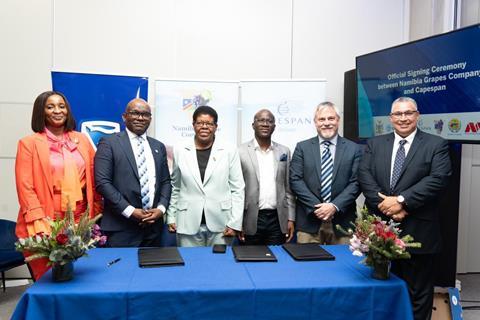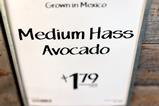South African exporter has extended its commercial partnership with table grape supplier NGC to 2045

South African company Capespan has underlined its commitment to the Namibian table grape industry by extending its joint venture contract with production partner Namibia Grape Company (NGC) to 2045.
The two companies have also unveiled a new ownership model for the partnership, which they officially renewed this week at the headquarters of Standard Bank Namibia in the country’s capital, Windhoek.
Erwin Tjipuka, the bank’s chief executive, said his organisation was proud to support what he described as a “world-class” table grape farm.
“This public-private partnership has demonstrated resilience and success over time, establishing itself as a true jewel in the Namibian agriculture industry,” he commented.
“Through this collaboration, the Namibian government, through the Namibia Grape Company, plays a pivotal role in uplifting local communities by creating jobs and bringing Namibian-grown grapes to the international market.”
According to Capespan managing director Charl Du Bois, NGC’s table grape production increased by 71 per cent over the past 17 years, from 1.4mn cartons in 2007 to 2.4mn cartons in 2024.
Du Bois emphasised the partnership’s transformative impact on the country’s grape industry – including the introduction of licensed premium varieties, improvements to infrastructure, and better market access – and revealed that Capespan plans to ship more fruit through Walvis Bay.
“Through our international network, we have connected NGC to leading global markets, allowing consumers in over 35 countries to enjoy these delicious, sun-kissed grapes from the Namibian desert,” he observed.
Namibia’s Minister of Sports, Youth, and National Service, Agnes Tjongarero, applauded the partnership’s role in job creation and economic empowerment.
“This collaboration not only strengthens Namibia’s presence in the global market but also brings meaningful employment and development to our communities,” she said.
New ownership model
NGC chair Richwell Lukonga revealed the venture’s ownership model had changed.
“With any partnership, it reaches a form of maturity that requires review, reflection, and assessment. From an NGC perspective, the partnership provided an opportunity to overcome its financial distress, reach a form of sustainability and create much needed employment, both permanent and seasonal.”
However, he said NGC and its shareholder Namibia Youth Service had reached agreement with Capespan on a new model that would bring more benefit to Namibian businesses.
“Various conversations and communication were had between the board of NGC and Capespan about a review and change in the model and partnership since 2020.”
As a result, terms agreed in November 2023 aim to establish a balanced distribution of risk and reward, he explained.
Ownership of the JV will be divided, with a 51 per cent stake held by NGC and a 49 per cent stake held by Capespan.
In addition, the lease cost or guaranteed profit for NGC rises to N$17mn (US$980,000) per year, with a 3.5 per cent annual increase aimed at providing financial stability over the next 20 years.
In that time, NGC will cover any necessary capital expenditure, proportional to its percentage stake, while both NGC and Capespan will share the annual working capital needs, including any incurred losses.
“Capespan will benefit from a long-term marketing agreement for the fruit produced by the JV, subject to review every five years,” Lukonga added.








